Mrs. Parkington (1944)
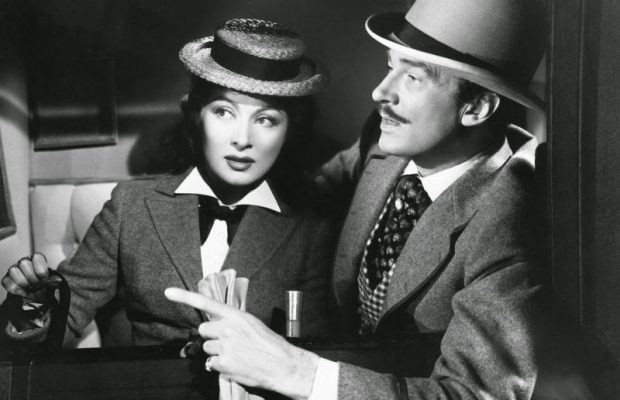
Toronto Film Society presented Mrs. Parkington (1944) on Sunday, October 14, 1984 in a double bill with City Streets as part of the Season 37 Sunday Afternoon Film Buffs Series “B”, Programme 2.
Production Company: M-G-M. Producer: Leon Gordon. Director: Tay Garnett. Script: Robert Thoeren and Polly James, from the novel by Louis Bromfield. Photography: Joseph Ruttenberg. Editor: George Boemler. Special Effects: A. Arnold Gillespie, Warren Newcombe, Danny Hall.
Cast: Greer Garson (Susie Parkington), Walter Pidgeon (Major Augustus Parkington), Edward Arnold (Amory Stilham), Agnes Moorehead (Aspasia Conti), Cecil Kellaway (Edward, Prince of Wales), Gladys Cooper (Duchesse de Brancourt), Frances Rafferty (Jane Stilham), Tom Drake (Ned Talbot), Dan Duryea (Jack Stilham), Hugh Marlowe (John Marboy), Selena Royle (Mattie Trounson), Fortunio Bonanova (Signor Cellini), Lee Patrick (Madeleine), Harry Cording (Humphrey), Celia Travers (Belle), Mary Servoss (Mrs. Graham), Tala Birell (Lady Norah), and Rod Cameron, Byron, Foulger, Kay Medford, Hans Conreid, Alma Kruger, Robert Creig, Howard Hickman, Doodles Weaver.
Mrs. Parkington is the fourth of Greer Garson and Walter Pidgeon’s eight co-starring vehicles. As a result of the enormous success of their three earlier pairings (Blossoms in the Dust, Mrs. Miniver, and Madame Curie), M-G-M provided a spectacular budget for this adaptation of a popular Louis Bromfield novel.
The novel, a sprawling saga of several generations of a large and wealthy family, seems at times like all 16 volumes of Mazo de la Roche’s Jalna condensed into one. While the film is a two-hour condensation of this volume, its pace is leisurely, and the audience has ample opportunity to admire Tay Garnett’s slick direction, Joseph Ruttenberg’s first-class camera work, and the lavish M-G-M sets.
The film tells the tale of this clan through a series of flashbacks from the point of view of Garson, the 84-year old matriarch. We learn, then, through these flashbacks, of the matriarch’s evolution from her origins as an orphaned daughter of a boarding-house keeper in a Nevada mining-town, through the years when she and her good-hearted scoundrel of a husband try to crash the social set in nineteenth-century New York, to their final elegant life-style where they hobnob with duchesses and the like. One would be very heartless indeed if one were to ask such basic questions as how this frontier girl instantly took on the charm, breeding, and dignified poise of a Greer Garson, or how her patience, loyalty and goodness could remain so constant when married to such a stubborn, violent and faithless cad. The audience is meant merely to bask in such 1940s truisms as “Behind every Empire-builder, there is a strong, good woman.” And indeed, the audiences of 1944 flocked to the film to do just that.
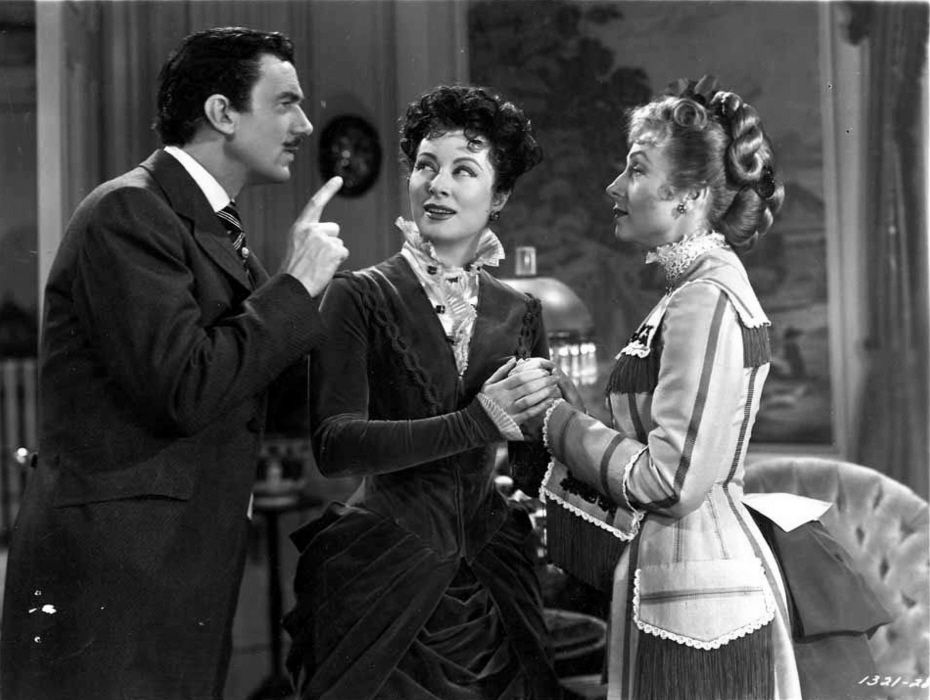
Mrs. Parkington earned Garson her fifth Academy Award nomination in almost as many years. The next year, in another Tay Garnett-directed film, The Valley of Decision with Gregory Peck, she would again be so honoured. But her future films with Pidgeon would be less acclaimed (Julia Misbehaves, That Forste Woman, The Miniver Story, and Scandal at Scourie). It would be only in 1960 with her role as Eleanor Roosevelt in Sunrise at Compobello, that she would again be among the Oscar contenders.
Miss Garson’s grooming and good manners became so much an icon of the 1940s that she was almost as important to the studio’s public image as Leo the Lion himself. From the vantage-point of 1984, the most appalling aspect of the Greer Garson phenomenon was that it encouraged Louis B. Mayer to subdue to the wondrous comic talent of Irene Dunne into a dignified Garson clone in films like The White Cliffs of Dover and A Guy Named Joe. (It was the same yen for breeding that made Mayer steal the witty Jeanette Macdonald from Paramount and Maurice Chevalier to turn her into the often uninteresting plastic partner of Nelson Eddy in the 1930s).
As for the late Walter Pidgeon, in his obituaries this autumn, the newspapers quite naturally recalled this Canadian -born actor’s role as Queen Greer’s consort. This whole Garson-Pidgeon corpus tends collectively to overshadow his fine work in such other films as How Green Was My Valley, Command Decision, Advise and Consent, and Funny Girl.
The cast credits for Mrs. Parkington read like a Who’s Who of the M-G-M supporting player stable. As excellent as each performer is in this film, it would be in other films that each one would achieve a reasonable facsimile of unabashed immortality: Edward Arnold as the capitalistic bigot in Easy Living and You Can’t Take It With You, Agnes Moorehead as Aunt Fanny in The Magnificent Ambersons, Cecil Kellaway as the leprechaun in The Luck of the Irish, Gladys Cooper as the repressive mother in Separate Tables, Tom Drake as the boy next door in Meet Me in St. Louis, Dan Duryea as the uncouth lower-boy in The Woman in the Window and Scarlet Street, and Hugh Marlowe as the playwright in All About Eve.
And even blessed with a cast like this, Mrs. Parkington still belongs to its stars!
Notes by Cam Tolton

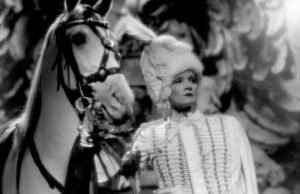
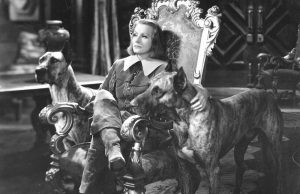
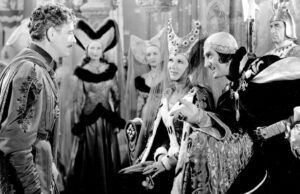






I disagree with you.I don’t have the knowledge or memory for studio history, that you obviously have, but I know what I love and what is good cinema and what is less good. I appreciate early attempts and love observing how directors and studios had to feel their way with a great talent and try different roles, leading men and makeup and costumes to finally find the right way to show a star at his or her best.
I just watched the early Lubitsch The Love Parade and I have a copy of Love Me Tonight which I have watched dozens of times.
It seems that it took a while for the studio and director to know what to do with Jeanette MacDonald, and they did it in The Merry Widow, to me a perfect musical. I can’t watch it enough.
Chevalier is a delight. They work together like a charm.
But I love her with Nelson Eddy in Naughty Marietta, Rose Marie. I don’t see her as wooden or plastic. She was charming, melodious, beautiful.
I believe that she had a good operatic voice, proven by the Tosca scene in Rose Marie.She could have sung at the Met. There was nothing plastic in that performance.
Nelson Eddy and Jeannette MacDonald were perfectly matched in life and on the screen. The love between them is obvious.
Their personal story is very romantic and very sad.There is a fascinating biography about them.
Naughty Marietta is a delight.
Chevalier was a genius and a charmer, embodying the French culture for the American audience.Jeanette MacDonald too had a Continental quality to her acting.
Irene Dunne was wonderful. I love her singing and dancing in Showboat.She sang beautifully and was an interesting type.( But her voice was not on the level of a Jeanette MacDonald).
Yes, Irene Dunne was so much more versatile than Greer Garson. It’s unfair to compare them. They are all so different. Very different beauty and talents. But all
magnificent in their own ways.
They gave us so much.
Miriam
Thank you for your comments, Miriam. Whether we agree or not with the ideas of the note-writer, it’s always good to see that these notes give us food-for-thought.
Cam Tolton, the note-writer, is still involved with TFS and although he doesn’t know very much about Jeanette MacDonald’s personal life, he had this to say:
“Of course, everyone has his or her own favourite performers. And also their own opinions.
I know that when we saw THE MERRY WIDOW in Hollywood at a TCM festival a couple of years ago, the J. MacDonald fans in the audience were uncontrollable, as were the Chevalier fans – – and the Una Merkel fans. What a crowd that was in the Egyptian Theatre! It is a marvellous movie! But I would insist that it is still more of a Lubitsch film than an MGM film. In its wit and sophistication. The later operettas sans Lubitsch are the ones that I have expressed admittedly personal objections to. Nobody is denying the talent of Jeanette MacDonald. Or of either Greer Garson or of Irene Dunne. It is MGM that had a closed mind about so many of their performers and their film plots and style.
Mary Astor as an example, early on in her career, gave zippy performances in films like MIDNIGHT and THE PALM BEACH STORY at Paramount or THE MALTESE FALCON and THE GREAT LIE at Warner Brothers. Look what MGM did with that talent: they shifted her into the bland mother roles in MEET ME IN ST. LOUIS and LITTLE WOMEN! Of course, she showed them all up when she later escaped into roles in DESERT FURY and RETURN TO PEYTON PLACE. If these roles were not showy to start with, she made them so.
I suspect that our letter-writer prefers MGM to RKO, for instance And so be it.”
With his response, it’s nice to know that there are many different takes and thoughts on vintage film in particular, and we appreciate hearing your point-of-view.
Caren